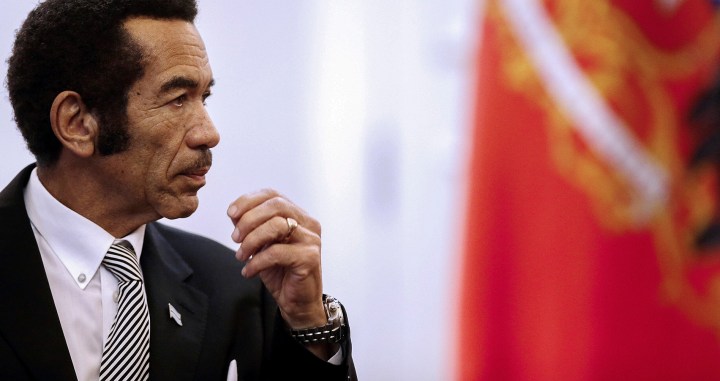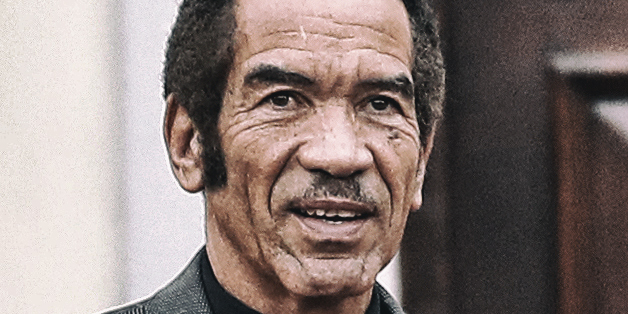LONG SHOT
Joburg court rejects Ian Khama’s pleas to be allowed to argue against being arrested pending extradition

Khama wants to avoid being incarcerated if Botswana decides to seek his extradition on what he regards as trumped-up charges of illegal gun possession.
Former Botswana president Ian Khama has failed to secure a Johannesburg High Court order that he should be allowed to make representations to a magistrate to avoid being arrested if the Botswana government tries to extradite him.
Khama told Daily Maverick he is considering whether to seek leave to appeal the high court judgment.
Khama left Botswana in November 2021 for South Africa where he has lived ever since, claiming that he fears for his life back home.
The high court heard that Khama “avers that he has been the target of a coordinated, state-sponsored attack by the incumbent president of Botswana [Mokgweetsi Masisi] for expressing his opposition to what the applicant says are the current president’s ‘authoritarian policies and decisions’.”
In an affidavit Khama told the court that as part of the onslaught against him, “Botswana intends to seek his extradition on what he says are ‘trumped-up, fabricated charges’. Should he be arrested in South Africa or extradited to Botswana, he will be persecuted for his political views, putting his life and bodily integrity at risk.”
Appeal to South African authorities
On 19 April 2022, Botswana authorities charged Khama with 13 counts of unlawful possession of seven firearms and the ownership of unregistered firearms, allegedly found in his Gaborone home. He has missed three court appearances in Botswana to face these charges as he has remained in South Africa.
On 22 June 2022, Khama’s attorneys wrote to the National Director of Public Prosecutions, the minister of justice and other South African government officials, saying it was possible South Africa might receive a request from Botswana to extradite Khama.
The attorneys said if that happened, Khama would cooperate fully with any extradition proceedings so “any efforts to arrest and detain him would be inappropriate, unreasonable, unlawful and unconstitutional”.
The attorneys asked for Khama, in that case, to be given an opportunity to submit representations to the appointed magistrate before the magistrate issued a warrant for his arrest.
Khama, as a former head of state, was clearly trying to avoid the indignity of arrest and imprisonment, pending the resolution of any extradition request from Botswana.
But the NPA refused this request, saying there was no provision in section 5 (1) (b) of the Extradition Act for a person to be given a hearing to argue against his arrest in this way. This section gives a magistrate the authority to issue a warrant for the arrest of a person whom another country seeks to extradite. This is the normal procedure.

Ian Khama believes that, should he be arrested in South Africa or extradited to Botswana, he will be persecuted for his political views, putting his life and bodily integrity at risk. (Photo: EPA / Felipe Trueba)
The NPA added that if Khama wished to argue that the charges brought against him had been trumped up, he must do so before the magistrate after his arrest. However as a “courtesy” to Khama the NPA would, if asked, inform him before his arrest “so that he can report to the SAPS and the necessary formalities be taken care of before the matter is placed on the court roll”.
Khama then approached the high court seeking an order that the NPA had wrongly interpreted section 5 (1) (b) of the Extradition Act. His affidavit added that if the court found that the NPA had interpreted section 5 (1) (b) correctly, it should then find that the Extradition Act was unconstitutional in failing to allow a person like Khama to be given a hearing to argue why he should not be arrested.
The NPA, the minister of justice and several other government officials opposed Khama’s application. The case was argued in March.
Last Thursday, 25 May 2023, Johannesburg High Court judges Raylene Keightley and Réan Strydom, with Gauteng Judge President Dunstan Mlambo concurring, handed down their judgment, dismissing Khama’s plea.
They said that the NPA had correctly interpreted the Extradition Act which conferred powers both on the magistrate and the minister of justice to decide whether a person should be extradited. It was up to the magistrate to decide if the person had committed an extraditable offence.
However, they added, “it does not lie within the ambit of a magistrate’s powers… to consider and make determinations on whether the affected person is likely to have a fair trial if surrendered, or whether the charges are trumped-up, as the applicant contends in his case. These considerations lie exclusively with the minister [of justice].”
The judges also rejected Khama’s complaint that section 5 (1)(b) of the Extradition Act was unconstitutional. They agreed with him that “both the right not to be deprived of one’s liberty arbitrarily or without just cause, and the right to have a legal dispute fairly determined in a court, are fundamental to the rule of law. There can be no gainsaying their importance.”
“On the other hand, to the extent that section 5(1)(b) limits these rights by not permitting a consideration of representations to a magistrate before the issue of a warrant of arrest, such infringement serves an important purpose. As we have said, it is aimed at securing the attendance of a person whose surrender is sought in an extradition process.”
“In this case, the Republic of South Africa is bound under a reciprocal extradition protocol with Botswana. It is in the interest of the country that these obligations are honoured. The minister in terms of the act is the person to make the policy-oriented decisions in this regard. To achieve this, a person sought to be surrendered must be available for surrender should such a decision be made. This is achieved by the arrest of such a person.”
Treaty obligations
The judges said it was vitally important for South Africa, as a sovereign state, to enact laws that fostered its reciprocal treaty obligations in extradition matters. This was imperative for international “comity” (harmonious relations among states). It also ensured that South Africa was better able to meet its own obligations to pursue criminal justice against perpetrators within our own borders.
The judges added that this limitation of a person’s freedom was not substantial. At worst the person facing extradition must be brought before a magistrate as soon as possible. At which point the magistrate could grant him bail. Over and above this, the minister of justice had the power to intervene at any stage to cancel a warrant of arrest for such a person even before its execution, or to order the discharge of a person who had been committed under an executed warrant.
Read more in Daily Maverick:
Former Botswana president Ian Khama denies fleeing the country
Botswana takes flak over its ‘persecution’ of former president Ian Khama
The judges said it was difficult to imagine how less-restrictive means could achieve the purpose “without undermining the entire edifice of extradition”.
Khama told Daily Maverick: “I have noted the judgment, which is based on a particular interpretation of the Extradition Act. I am studying the judgment with my legal team and will decide on whether to bring an application for leave to appeal in due course.”
Khama has been engaged in a running battle with his successor, Masisi, ever since he stepped down as president in 2018 over various policy differences as well as disputes about his privileges as a former president and his right to oppose Masisi politically. The spat included prosecutions against his associates for allegedly plotting to siphon billions of pula out of Botswana to finance a scheme to topple Masisi. The Botswana courts threw out the charges in August 2021, dismissing them as “a lie orchestrated from the outset by highly ranked public officers who are accountable only to themselves”. DM


















 Become an Insider
Become an Insider
I am inquisitive how Khama has residence in South Africa as a Botswana citizen?
Chat to Zuma and get a hospital stay before going home! Worked for him so might work for you! Or maybe only half work for you given your ancestry!